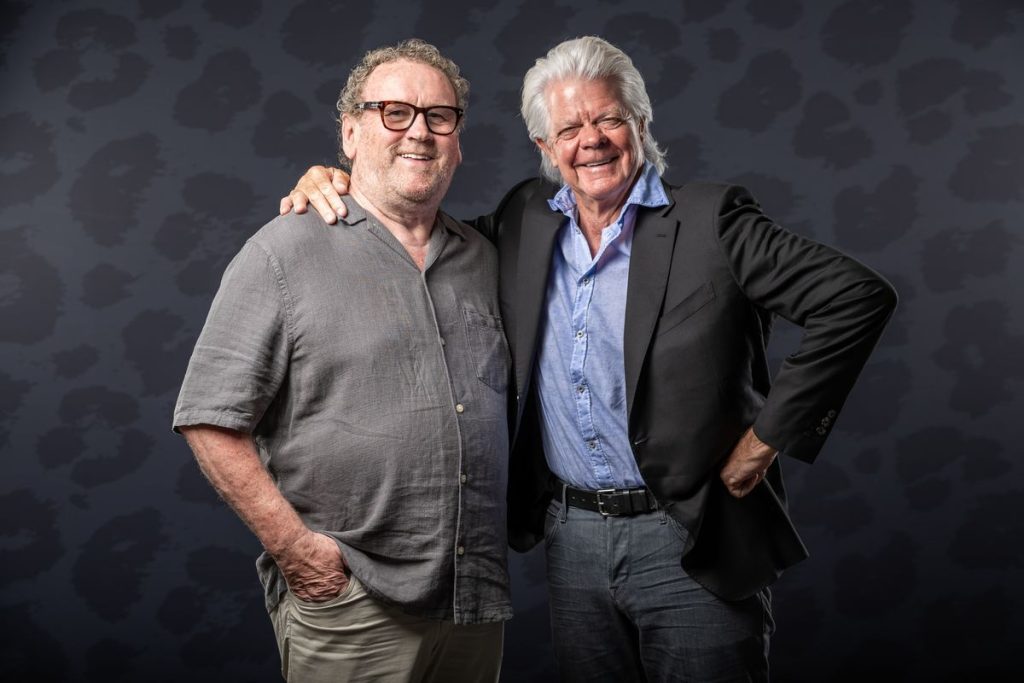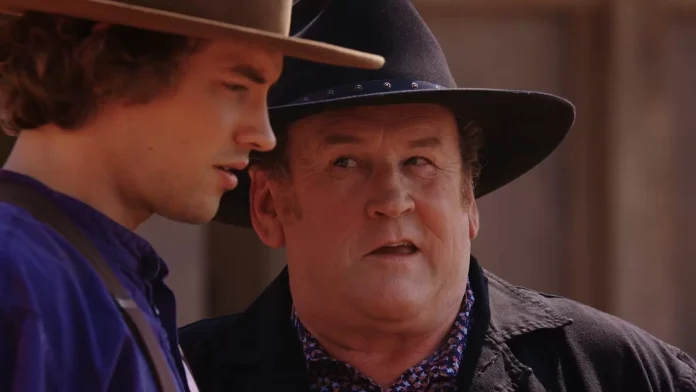With a legacy spanning decades in cinema, television, and theater, Colm Meaney continues to surprise with his versatility and charisma. Included in the list of “50 Greatest Irish Film Actors of All Time” by The Irish Times in 2020, Meaney has over 150 credits in film and television, standing out for his roles in films such as The Commitments, The Snapper and The Van — based on Roddy Doyle’s trilogy — as well as Con Air and Layer Cake, and in series such as Star Trek: Deep Space Nine (1993–1999).
Before we see him later this year in The Panic, in the role of banker J.P. Morgan, the Irish actor now appears at the Locarno Film Festival with Legend of the Happy Worker, a film in which he takes on the role of Clete, an enigmatic figure who introduces tension and ambiguity into an apparently happy world.
Directed by Duwayne Dunham, Legend of the Happy Worker reaches audiences as “a fable for our time,” blending humor and social critique in an aesthetic that oscillates between the western and classic Disney animation. With a deeply absurd style, the film inevitably evokes the singular atmosphere of David Lynch — who served as executive producer.
Colm Meaney spoke to us about the project, his acting process, changes in the industry, and his critical view on the future of cinema.
Can you tell me how you ended up getting involved in this project and what your first impression was when you read the script?
It came to me in the usual way—I mean, it’s a very unusual film, I know—but my agent sent me the script and asked what I thought. I read it and loved it. I didn’t even know what it was about. I couldn’t tell how it would be realized. But I loved the writing of the dialogue and I really liked the character. So I just said, “Yeah, let’s do it.” And that was it.
Can you tell me how you got involved in this project—and what your first impression was?
It came in the usual way—I mean, it’s a very unusual film, I know—but my agent sent me a script and said, “What do you think?” I read it and loved it. I didn’t know what it was about. I couldn’t tell how it would be realized. But I loved the writing of the dialogue, and I liked the character very much. So I just said, “Yeah, let’s do it.” And that was it.
And how was your conversation with the director about approaching such a unique and specific role?
Well, Dwayne was wonderful in that he kind of cut me loose on it. He said, “You know, whatever you want to bring to this character is fine with me.” He kind of hinted that it could be as big as I wanted, because we’ve more or less decided that this film is like a live-action cartoon. It’s very cartoonish in a lot of the action and even some of the dialogue.
So it’s bigger, broader—it’s not naturalistic. Once I got that in my head, and from the script, I could tell this guy is the bad guy, but he’s also very dramatic. He’s a bullshitter—he tells all sorts of nonsense, doesn’t listen to anybody, just steamrolls everyone around him. That gave me carte blanche. Dwayne was very much in favor of it—“Go for it.” So I kind of feel like I chew the scenery a little bit in this one.
Working on a project that’s been 30 years in the making—did that add any pressure because it’s like the director’s passion project?
Yeah, well, Dwayne’s a very laid-back guy—you know, a Californian surfer dude—and I never felt any pressure from him. But I can imagine he felt a lot, especially in the latter stages. The 30 years trying to get it made was one thing, but then after it was made, there were disputes about ownership and lots of shenanigans on the business end. That’s why the release was so delayed.
I can imagine he had a lot of pressure. This was his passion project, and then you have all these complications on the business side—things that have nothing to do with the art or the actual filmmaking.

With a career as extensive as yours—I believe you’re approaching 150 credits [IMDB]—how do you decide which roles to take now?
I go by the scripts. I read them, and if they excite me, if they spark my interest, I pay attention. I usually read the script first as an audience member—if it grabs me, then I go back and look at it again from the character’s perspective. I examine it more closely: Do I think I’m right for it? Can I play it? Do I want to play it? That’s the process.
You’ve been in the industry a long time. With the shift from film to digital and now streaming—how has that changed the work of an actor?
Yeah, well, I think there are two different things here. On one hand, streaming platforms have opened up more opportunities. The fact that cinemas are now taken over by comic books means there’s almost nothing else out there. For kids coming up who want to watch an interesting, original film—where do they go? All the multiplexes show now are comic book movies. It’s like the infantilization of an entire generation.
But digital platforms have given space to directors who, in the 1970s, would’ve gotten cinema releases. Now, even Scorsese is going to Netflix. It’s crazy—absolutely crazy.
From a work point of view, though, the digital camera has basically destroyed the actor’s process. For over 100 years, we developed a way of working: rehearse the scene with the director, show it to the DP, make adjustments, show it to the crew, make more adjustments. Then the actors go off to prepare, the crew finishes their work, and you rehearse with the camera. By the time you shoot, everyone knows exactly what they’re doing—everyone’s confident, clear. That was the film way.
Now that’s all gone. They just start shooting: “Try that, try this, try that.” It’s bullshit. Sometimes, I’ve been on sets where they don’t even tell the actor where the camera is.
Part of an actor’s craft is playing to the camera—you’re aware of where it is, even if you’re not looking at it. You adjust slightly, knowing the angle. But that doesn’t matter anymore.
I feel so sorry for editors—they must get thousands of frames of useless footage. I’m sure 90% of what comes from a set now is junk, because it’s just “shoot this, shoot that.” Producers and directors think this speeds things up, but it doesn’t. It still takes just as long to shoot a picture. You’re far better off getting it right the first time.
And another thing that drives me nuts: you do a take, then they say, “Okay, let’s go again.” Then the DP says, “Hold on, just a little adjustment here.” He makes it, but that affects something else, which affects another thing. Half an hour later, you’re still waiting—and it’s not even the same setup anymore. The camera was over there last time, now it’s here because a lamp moved. It’s a clusterfuck.
And look, there’s no reason you can’t shoot the proper way on digital. I remember talking to Stephen Frears about this. I said, “Digital has destroyed our process.” He said, “Nonsense, nonsense—what are you talking about?” I asked, “Do you shoot on digital?” He said yes. I said, “Has it changed your method?” He said no. He still shoots exactly the same way he did on film—because he came up that way.
But so many directors today never shot on film. They don’t even know what I’m talking about.
Speaking about your career—have there been any roles that stayed with you? Any film you look back on and think, “That was a great experience”?
Yeah, there are a few. The trilogy I did was based on Roddy Doyle’s books—The Commitments, The Snapper, The Van—those were special. I worked with Alan Parker on The Commitments, then Stephen Frears on the other two. They were wonderful experiences, and playing the same character across three films was a real gift. It wasn’t a masked man or someone in a cape—it was proper character work. That was great.
I also did a wonderful film with the great Serbian auteur Goran Paskalović, who became a good friend. It’s called How Harry Became a Tree. We premiered it at the Venice Film Festival in 2001, and we were heading to Toronto when 9/11 happened. The festival collapsed, and the film never got proper distribution. Everyone was in panic mode—it just got lost.
Goran was a wonderful genius. He wrote the screenplay with his son, based on an old Chinese proverb, but set it in Ireland with Italian producers—a crazy mix of things. But it was such a beautiful, poetic film. It breaks my heart when I think about how it disappeared.
What was your biggest challenge in this film, Legend of the Happy Worker? And do you generally seek out challenging roles?
Yeah, I like a variety of roles—I try to mix it up, do different things. That’s why this one was intriguing. I’d never seen a script like it. And with good writing, it’s like being a musician: when you get a great piece of music, you just play the notes and it comes out. That’s how I felt with this character—he was very well written.
It led me to being very big, very dramatic, and Dwayne, as director, allowed me to do that. It’s a very—some might say—over-the-top performance. But I enjoyed it.
Do you like over-the-top performances?
I mean, look—one of my favorite actors is (Jack) Nicholson. I thought he was the greatest. He played big, you know what I mean? But I always loved his work. It was extraordinary.
What’s next for you? And do you still value the theatrical experience more than streaming, or has that changed?
Well, I have a film I did last year called The Panic—it should be coming out in December. It’s a brilliant script about the financial crisis of 1907, which not many people know about because it was overshadowed by the 1929 crash. But it was actually engineered by J.P. Morgan for his own benefit. It’s got J.P. Morgan, Rockefeller, Teddy Roosevelt—really fascinating stuff.
It’s getting a small release in December for awards consideration, then hopefully a wider release in January. I’m hoping it gets a good theatrical run. The other thing I just finished shooting in Vancouver is a project with Sally Field—it’s a Netflix film, so it’ll be on streaming.
You just hope your work finds an audience, whether it’s in theaters or on streaming. I’d prefer it to be in theaters, but… there’s nothing there anymore. The only things in cinemas now are superheroes and comic books.
So you don’t go to the movies anymore?
No. No. There’s nothing I want to see.
When I was growing up in the 70s, you went to the cinema to see Scorsese, Bertolucci, Hal Ashby. Now? All you can see is a fucking comic strip. Yeah. It’s terrible. It’s tragic. It’s a problem.
One last question—do you think film festivals like Locarno are important for cinema, since they showcase such unique and diverse films?
Absolutely. That’s why I try to support film festivals. I was at one this year—I go to small ones too. Anywhere that promotes film, you have to support it. Otherwise, it will die.


